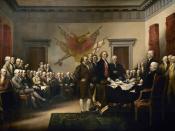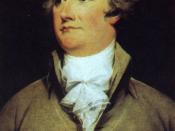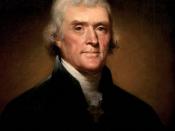By the end of the 18th century the United States of America had survived twelve years as a constitutional government. During that time notable events happened that shaped the way of American politics. Domestic and Foreign affairs produced trouble. Domestically, the federal power was questioned while minorities' existence in the country was getting limited. Outside of America, the French Revolution sparked debate over many subjects. Americans were divided as to whom they should ally themselves with, their ally, France, from the American Revolution or their enemy, Britain, during that conflict. Furthermore, controversy developed between an industrializing North and an agrarian-based South. As a result, the representatives of the states had split themselves into two separate parties, the Federalists led by Alexander Hamilton and the Republicans led by Thomas Jefferson. National, as well as international affairs separated Americans from each other and created a political party system, which shaped how politics were dealt with in the 1790's.
Politics were greatly shaped by many domestic affairs. Domestic troubles followed the creation of a new government and in 1794, angry Pennsylvanian farmers united together to oppose the federal whiskey tax. The Whiskey Rebellion raised questions as to how the government would deal with opposition. Alienating many agriculture based citizens, Washington firmly terminated the rebellion and thus, established the power of the federal government to enforce its laws as well as the president's right to utilize state militias. Four years later, in 1798, the Federalist controlled Congress passed and put into law the Alien and Sedition Act. It was designed to repress opposition and flagrantly violated constitutional rights of the people. The issue divided Americans and led Jefferson and his supporters to draft and pass the Kentucky and Virginia Resolutions that asserted the right of states over the federal government. These events proven themselves...


